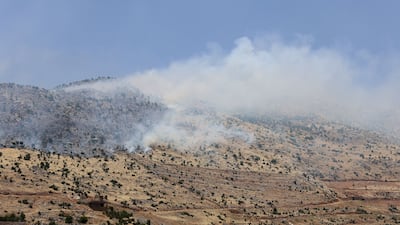Live updates: Follow the latest news on Israel-Gaza
A wave of Israeli air strikes hit southern Lebanon on Saturday, after UN officials warned that escalating violence between Israel and Hezbollah could lead to full-scale war.
Announcing air strikes and artillery fire against what it claimed were Hezbollah targets, Israeli forces released videos over the weekend showing buildings being devastated in huge explosions.
More than 90 civilians have been killed in Israeli strikes on southern Lebanon, with about 370 Hezbollah fighters killed also among the dead. Fifteen soldiers and 11 civilians have been killed in Israel since October 8.
Hezbollah launched attacks on northern Israel a day after the Hamas-led attack on October 7 that led to the devastating war in Gaza.
On Sunday, the Lebanese group released videos purporting to show an anti-tank guided missile attack on an Israeli observation post, and a drone strike on a military base.
The group said the Meron base was the target of an attack launched "as part of the response to the attack and assassination carried out by the enemy in Jouaiyya", where Hezbollah commander Taleb Sami Abdallah was killed in an Israeli strike on Tuesday.
Israel described Mr Abdullah as "one of Hezbollah's most senior commanders in southern Lebanon".
One of the missiles Hezbollah used in its counterattack appeared to be an Almas, an Iranian missile based on an Israeli weapon, Spike, which can glide over hills and other obstacles, steered towards its target by camera imagery beamed back to the operator. Hezbollah began using the weapon in January, signalling new tactics in the long-running conflict.
Israeli said it bombed Aitaroun and Chihine, both close to the border, with Hezbollah infrastructure the targets of the attacks on Saturday. On Sunday, Israel said the village of Al Amra had been targeted with artillery, while airstrikes hit the villages of Marwahin and Kafr Kila, also along the border.
No casualties were reported by Israel or Hezbollah. The armed wing of the Palestinian Islamic Jihad militant group said one of its fighters was killed in southern Lebanon.
Hezbollah and Israel have been engaged in some of the worst violence since a full-scale war in 2006 that killed about 1,200 Lebanese, mostly civilians. Israel reported the deaths of 44 civilians and 121 soldiers in the conflict.
There is a "very real" risk a miscalculation along Lebanon's southern border could lead to a wider conflict between Hezbollah and Israel, UN officials warned on Saturday.
In a full-scale conflict, some analysts say Hezbollah could fire around 1,000 missiles and rockets into Israel per day, part of an arsenal of up to 150,000 projectiles that could overwhelm Israel's Iron Dome missile defence system.
It is unclear how much of their arsenal has been depleted in the current conflict, but one of the group's larger barrages last week saw 215 rockets fired.
The group has also been launching its largest volleys of drones, saying entire "squadrons," have been deployed.

UN special co-ordinator for Lebanon, Jeanine Hennis-Plasschaert, and head of UN peacekeeping forces in the country, Aroldo Lazaro, said they were "deeply concerned" about the recent escalation in the region.
"The danger of miscalculation leading to a sudden and wider conflict is very real," the officials said in a written statement on Saturday.
War plans
Israel is said to be preparing for a full scale war in the north, in part to ensure around 60,000 displaced Israelis can return to their homes. Around 100,000 Lebanese civilians have also been displaced from villages north of the border.
Such a decision will be controversial in Israel, in part because of the high casualties their forces suffered in the 2006 war, and the widespread belief that Hezbollah now is more powerful - and a significantly stronger foe than Hamas in Gaza, where over 300 Israeli soldiers have died.
But members of Mr Netanyahu's government have been pressing the issue, with Finance Minister Bezalel Smotrich insisting that Israel will not be safe until the group is defeated.
Others have more limited war aims - to push Hezbollah north of the Litani river, a condition that the UN insisted upon at the end of the 2006 war, under UN Security Council Resolution 1701.
If Israel could achieve this goal, which would involve heavy fighting within Lebanon, it would put significant parts of Israel out of range of the group's shorter range rockets, which make up the bulk of their arsenal.
Since the Israel-Gaza war began Israeli soldiers have been conducting regular drills for war in Lebanon, and the Northern Command - the branch of the military responsible for northern Israel - says it is ready to mobilise reserves if ordered to expand operations.

